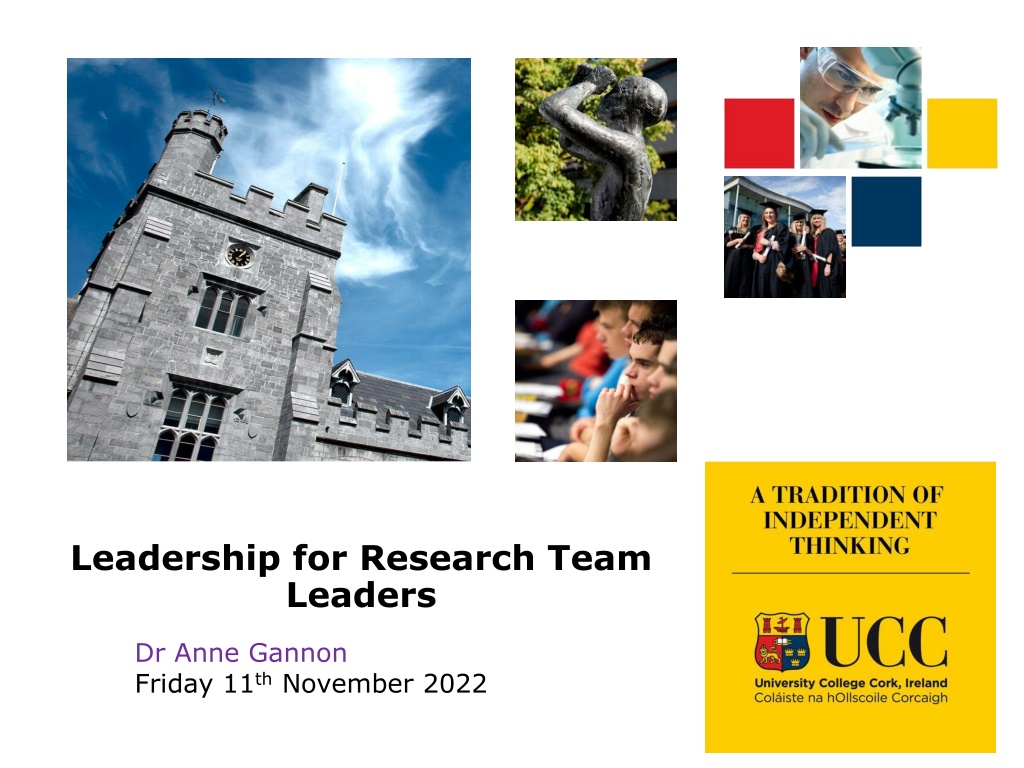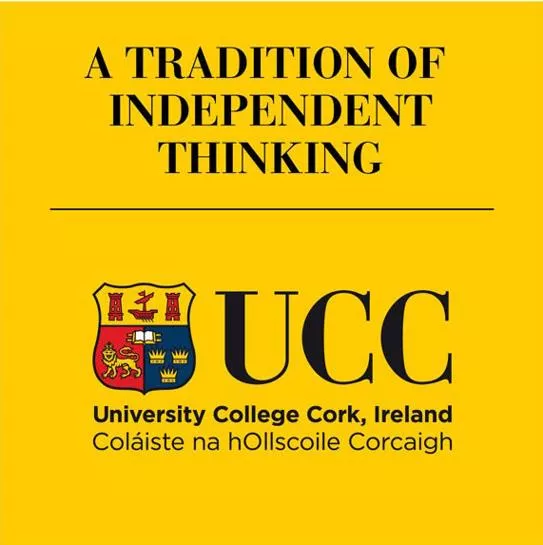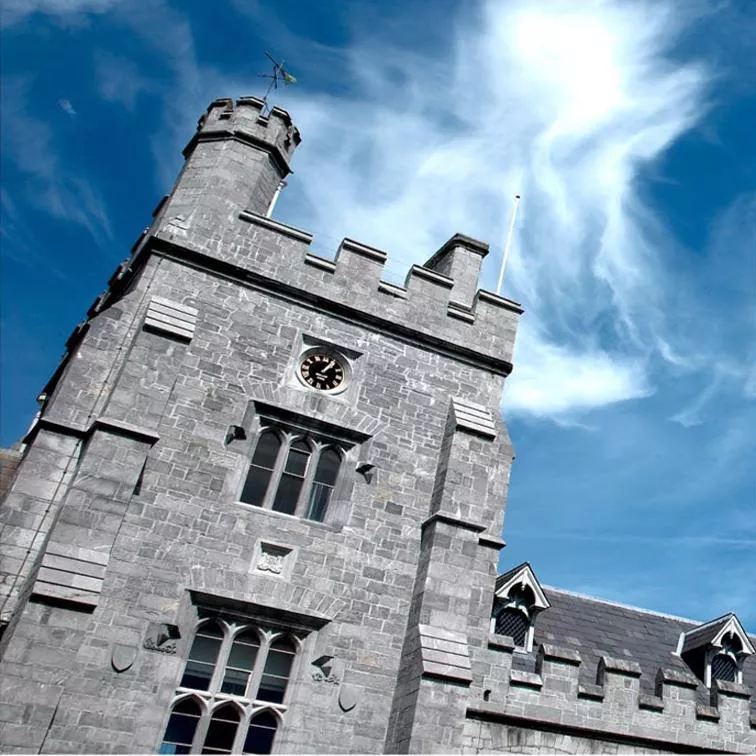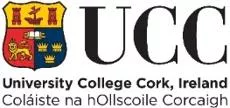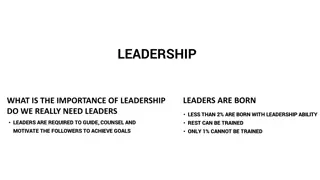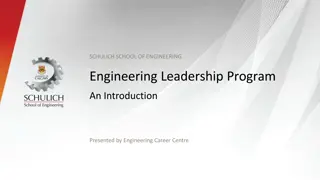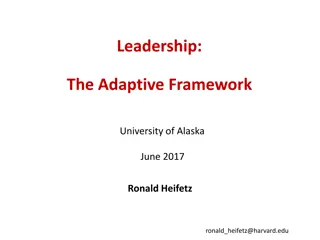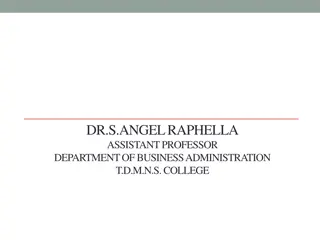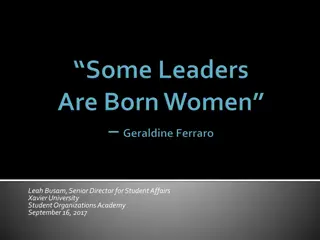Developing Effective Research Leadership Skills
Reflect on the qualities of effective research leaders, explore leadership vs. management, and learn how to grow your leadership expertise. Understand the behaviors that define strong research leadership and consider how to enhance your own leadership capabilities for success in a research team.
Download Presentation

Please find below an Image/Link to download the presentation.
The content on the website is provided AS IS for your information and personal use only. It may not be sold, licensed, or shared on other websites without obtaining consent from the author. Download presentation by click this link. If you encounter any issues during the download, it is possible that the publisher has removed the file from their server.
E N D
Presentation Transcript
Leadership for Research Team Leaders Dr Anne Gannon Friday 11th November 2022
LEARNING OBJECTIVES Reflect on the strengths and attributes of effective research leaders and the approaches and behaviours that each researcher demonstrates as a current or potential leader Introduce researchers to definitions and ideas of leadership Briefly explore the difference between leadership and management Consider the advice which successful research leaders offer in achieving research success Review the model of Action Centred Leadership (Adair, 1973) Next steps taking action to grow your leadership expertise
Reflection What are the approaches and behaviours that demonstrate strong and effective research leadership? From your own experience, what makes a researcher an effective research leader? What are the approaches and behaviours that I myself currently practice in demonstrating research leadership in my role? What approaches and behaviours would I like to develop further in becoming an effective research leader?
Definitions A research team is a group of people working together in a committed way towards a common research goal (vitae.ac.uk) Leadership is influencing others people to follow Effective leadership enables followers to succeed. It sets direction, builds a vision and adapts as circumstances require. A good leader creates a vision of the future, works well with a team, enables their team s success and demonstrates flexibility (Emerald Works, 2021)
What is the difference between leadership and management? Leadership and Management are not the same thing. They are distinctive, yet complementary processes. Leaders are forward-thinking and change-oriented while managers focus on consistency and efficiency in accomplishing tasks Theories of leadership often emphasise mechanisms such as vision, inspiration, and relationships aimed at influencing people Models of management focus on mechanisms such as planning, directing, and organising aimed at overseeing work
Action Centred Leadership (John Adair, 1973) John Adair s model looks at what an effective leader needs to do rather than the characteristics they need to display. An effective leader addresses the needs of the TASK TEAM INDIVIDUAL
Identifying the role of the Research Leader Action Centred Leadership (The 3 circles model) (John Adair, 1973) identifies the core actions you must take to lead your team effectively. These actions are grouped into three areas: Task: the actions that you take to achieve a goal. Team: your actions at the group level, to encourage effective teamwork and group cohesion. Individual: actions that address each team member's unique needs.
What advice do current research leaders offer? Science must come from the heart. Treat everyone with respect. Listen. Be authentic. Ask for help. Don t be afraid to say you don t know. Communicate. Put your mentees first. Don t give up. Stay humble. Be honest with yourself. Give yourself time to think (Antes & DuBois, 2018)
Keys for Researcher Success Integrity 19% Balance 21% 52 well-respected principal investigators were interviewed to uncover for their top advice for early- career researchers. Most research participants offered several pieces of advice, which were organised into a number of themes Strategy 29% Leadership 33% Resilience 37% Passion 42% Relationships 54%
Demonstrating the 7 keys to success in research Cultivate relationships and draw strength from others. Build a rich network of great colleagues and be willing to learn from others. Do research you are passionate about and find joy in your work. Be resilient in response to criticism and failure. Learn from failures and do not take criticism personally. Believe in what you are doing. Be an engaged, respectful team leader. Be deliberate about building your team, interact with your team members regularly, and take time to listen.
Demonstrating the 7 keys to success in research Stay focused, make strategic decisions with your goals in mind and advocate for yourself Adopt a balanced approach have interests outside work and give yourself time to think. Demonstrate integrity by committing to the required hard work, be honest with yourself and remember that cutting corners never pays
How to grow your leadership expertise Participate in a leadership development programme as these require professionals to do something they often fail to do: stop and reflect (Porter, 2017 as cited by Antes & DuBois, 2018). Work with a coach or a mentor. Seek advice, support and feedback from others Build relationships and grow your network Take on more responsibility and seek opportunities to work with others Develop greater self awareness and practice reflective learning regularly
Resource Tree Showing Staff Resources
Your Action Plan What action are you now going to take to become a more effective research leader?
Follow us on our social networks Staff Wellbeing & Development @UCCWellDev @uccstaffwell_dev
